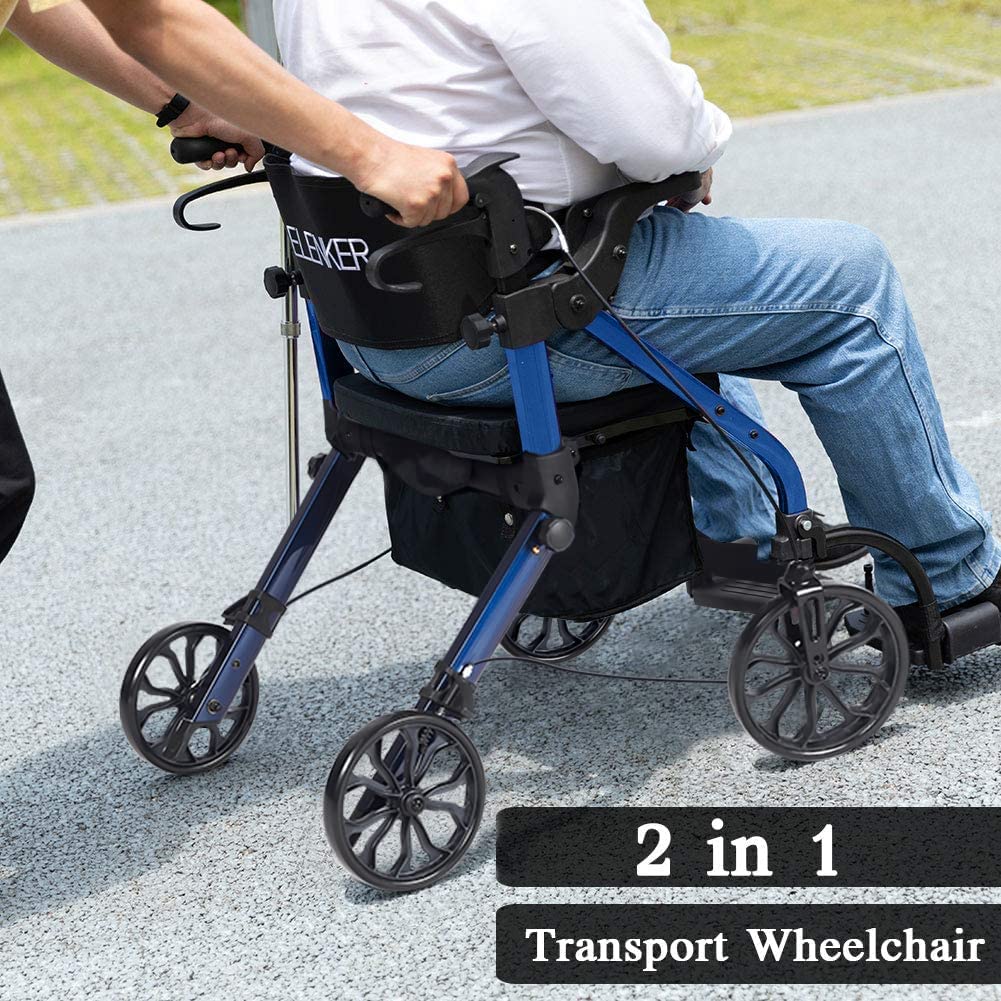Are Rollator Walkers Helpful for People with Brain Injuries?
Apr 23, 2025
When someone’s recovering from a brain injury, even the simplest tasks like walking to the kitchen or heading outside for a little fresh air can suddenly become a real challenge. That’s where mobility aids come into play—and one of the most popular tools out there is the rollator walker.
So let’s talk about it. Are rollator walkers actually helpful for people with brain injuries? Short answer: yep, they really can be. But of course, it depends on the person and what kind of challenges they’re dealing with.
What Exactly Is a Rollator Walker?
Okay, first things first. A rollator walker isn’t the old-school walker you have to lift and move every two steps. Nah, this one’s got wheels, usually four, and it rolls along with you. That’s why you might hear it called a rolling walker, rolled walker, or walker rollator. Most of them also come with hand brakes and a built-in seat—perfect for when you need a break.
There are a bunch of different styles out there, from the heavy-duty ones to the sleek, lightweight rollator walker models. You can even find a rollator walker with seat near me (just toss that in a search bar and you’ll see what I mean).
What is a Rollator Walker? check KLD-9269 ELENKER® 2 in 1 Rollator Walker videos and how to use it
Why They Can Be So Helpful After a Brain Injury
After a brain injury, your coordination, balance, and strength can take a hit. Even if you’re motivated to get moving, your body might not fully cooperate. That’s where a rollator mobility walker comes in handy.
1. They Help Keep You Steady
Brain injuries often mess with balance. A rollator walker acts like a third (and fourth) leg-giving you extra stability so you don’t take a tumble. Whether you’re walking around the house or out in public, it offers that extra bit of support your body might be missing.
2. They Let You Rest When You Need To
Fatigue is super common after a brain injury. You might feel totally wiped out after walking for just a few minutes. A rollator walker with seat means you can stop and rest anytime, anywhere. Total lifesaver.

KLD-9269 ELENKER® 2 in 1 Rollator Walker with a seat to rest
3. They Keep You Independent
Let’s be honest—it’s frustrating when you feel like you have to rely on others for everything. A rollator walker gives you some of that independence back. It makes it easier to get around your house, go for a walk, or even do a little grocery shopping.
4. They Help with Rehab
Therapists often use rollators during physical rehab. They’re a great way to relearn how to walk properly while staying safe. Plus, using one builds strength and confidence, which is a big win in recovery.
Some Things to Consider
While a rollator walker can be a big help, it’s not a perfect fit for everyone with a brain injury. Here are a few things to keep in mind:
Cognitive Challenges: If someone has memory issues or difficulty understanding how things work, the brakes or folding features might be tricky. Simpler is usually better.
Space Matters: Rollators are awesome, but they do take up a bit more room than standard walkers. You’ll want to make sure there’s space in your home to use one comfortably.
Fit is Key: Everyone’s needs are different—so not every walker will be the right fit.. Make sure the height and width match the user’s size. An ill-fitting walker can be uncomfortable or even unsafe.
How to Pick the Right One
Shopping for a rollator can be a bit overwhelming. There are tons of options. If you’re browsing online or asking around for a "rollator walker with seat near me," here are some features you might want to look for:
Lightweight Frame: A lightweight rollator walker is easier to maneuver and transport.
Padded Seat: If you’re going to be sitting, might as well be comfy!
Locking Brakes: For safety, especially when sitting down.
Adjustable Handles: So it fits your height and reduces strain.
Storage Basket or Pouch: Super handy for carrying stuff like snacks, keys, or even your phone.

KLD-9269 ELENKER® 2 in 1 Rollator Walker
Rollator vs Other Mobility Aids
There are lots of mobility aids out there - cane, wheelchair, traditional walker, you name it. What makes a rollator different is its balance of support and mobility. A cane might not offer enough stability, and a wheelchair might be more than what someone needs.
Rollators hit that sweet spot for people who can walk but just need a little extra help. They’re especially good for folks who want to stay active but safe at the same time.
Getting One Covered
Good news: many insurance plans will help pay for handicap walkers and other mobility aids with a doctor’s prescription. It’s worth talking to a physical therapist or doctor, who can point you in the right direction and might even help with getting it covered.
So, are rollator walkers helpful for people with brain injuries?
Heck yeah, they can be a huge help. They offer support, independence, and peace of mind - all while helping people stay active during recovery.
Of course, no two people are exactly the same, so the best move is to chat with a healthcare provider to see what fits your needs. But if you or someone you care about is dealing with mobility challenges after a brain injury, a rollator walker with seat might just make life a whole lot easier.
And hey, you don’t have to search far and wide—there’s probably a great rolling walker or walker rollator available right around the corner. Just hit up your favorite medical supply store or search for a "rollator walker with seat near me," and you’ll be well on your way.
Stay strong, stay safe, and keep rollin’!











